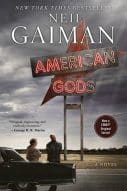
American Gods is a chimera, a creature born of a fusion of disparate parts. Except for the obligatory invocation, American Gods follows the conventions of the classic epic. Yet, it is also visionary fiction, horror, adventure, folklore, legend, fantasy, mythology, and postmodernism as its best. Gaiman’s daring rejection of the tenets of the Literary Canon, also referred to as “the dead white guys,” is stunning in its conception, its scope, and its realization. American Gods shimmers with magic and mystery. Somewhere, far away, William Blake is smiling.
The protagonist is a man who is called Shadow Moon because as a child he always followed his mother, like a shadow. However, his dead wife later says to him, “You’re not dead. But I’m not sure that you’re alive, either. Not really.” Perhaps the dead know more than the living. Shadow is released from prison and soon goes on an epic journey across America, perhaps in a subliminal search of what is means to really be alive so that he will no longer be a shadow.
The marvelously original and seriously complex plot is organic and non-linear. At first glance might appear random; however, it is nothing of the kind. This realization comes with completion of the read. Interludes and flashbacks interrupt the flow, but they do indeed support the premise. On his pilgrimage across country, Shadow is exposed to an America he never knew existed. Because the author sees with new eyes, Shadow finds wonder at every turn. Many American readers will find themselves wondering how they missed all those magical places. No doubt, some will choose to search out the world’s largest carousel or the umbilicus of the nation.
The underlying premise of the story comes from the belief that when settlers came to America, they brought their gods with them. “We rode here in their minds, and we took root.” Then, after a while, the new Americans forgot their gods. The forgotten gods then incarnated and found mundane, earthly jobs in order to survive at an quasi human level. They go on to assimilate, living among society, undetectable. Ultimately, their former worshipers found new gods, giving cause for a supernatural war.
“Now, as all of you will have had reason aplenty to discover for yourselves, there are new gods growing in America, clinging to growing knots of belief: gods of credit-card and freeway, of internet and telephone, of radio and hospital and television, gods of plastic and of beeper and of neon. Proud gods, fat and foolish creatures, puffed up with their own newness and importance.”
Gaiman’s style is highly literate. His metaphors are meaningful and often ironic. His dialogue is intelligent, smooth, and natural. He reveals the nature of his characters without any tell. Instead, readers meet and understand who they are by what they do and say. For example, Shadow’s decency is revealed when he works in the funeral home: “He picked up Lila Goodchild, cradling her in her opaque bag like a sleeping child, and placed her carefully on the table in the chilly mortuary, as if he were afraid to wake her.”
The characters, many of whom are fallen gods, are quirky, funny, and psychotic. They form a glorified carnival of archetypes. Arguably, the most pivotal archetype is the sacrificial redeemer. And as it should be, the number three and its multiples haunt the text. The second major, Wednesday, is a total cipher until late in the book, even though the author drops many hints that will be snapped up by those well versed in mythology. Gaiman’s enormous mythology begins with Norse gods then proceeds to introduce a motley collection of gods from all over the globe, which makes sense since America was founded by immigrants from a myriad of nations.
American Gods might not be for everyone, but daring readers open to bathing in magic will love this sublime novel. American Gods is a commentary on society that urges readers to see America anew and to look into their hearts and wonder if they have chosen their gods wisely.
“The gods are great…but the heart is greater. For it is from our hearts they come, and to our hearts they shall return…“
P.S. The TV show is fun, but it pales in the shadow of the text.
Visit Neil Gaiman at GoodReads
American Gods is a commentary on society that urges readers to see America anew and to look into their hearts and wonder if they have chosen their gods wisely.

Book Title: American Gods
Book Author: Neil Gaiman
Book Format: Hardcover
